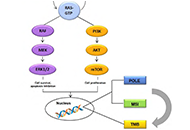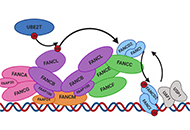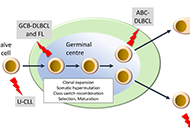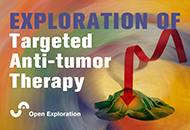Colorectal cancer genomic biomarkers in the clinical management of patients with metastatic colorectal carcinoma
Colorectal carcinoma (CRC) is an heterogeneous disease in which different genetic alterations play a role in its pathogenesis and progression and offer potential for therapeutic intervention. The re
[...] Read more.
Colorectal carcinoma (CRC) is an heterogeneous disease in which different genetic alterations play a role in its pathogenesis and progression and offer potential for therapeutic intervention. The research on predictive biomarkers in metastatic CRC (mCRC) mainly focused on the identification of biomarkers of response or resistance to anti-epidermal growth factor receptor monoclonal antibodies. In this respect, international guidelines suggest testing mCRC patients only for KRAS, NRAS and BRAF mutations and for microsatellite instability. However, the use of novel testing methods is raising relevant issue related to these biomarkers, such as the presence of sub-clonal RAS mutations or the clinical interpretation of rare no-V600 BRAF variants. In addition, a number of novel biomarkers is emerging from recent studies including amplification of ERBB2, mutations in ERBB2, MAP2K1 and NF1 and rearrangements of ALK, ROS1, NTRK and RET. Mutations in POLE and the levels of tumor mutation burden also appear as possible biomarkers of response to immunotherapy in CRC. Finally, the consensus molecular subtypes classification of CRC based on gene expression profiling has prognostic and predictive implications. Integration of all these information will be likely necessary in the next future in order to improve precision/personalized medicine in mCRC patients.
Anna Maria Rachiglio ... Nicola Normanno
Colorectal carcinoma (CRC) is an heterogeneous disease in which different genetic alterations play a role in its pathogenesis and progression and offer potential for therapeutic intervention. The research on predictive biomarkers in metastatic CRC (mCRC) mainly focused on the identification of biomarkers of response or resistance to anti-epidermal growth factor receptor monoclonal antibodies. In this respect, international guidelines suggest testing mCRC patients only for KRAS, NRAS and BRAF mutations and for microsatellite instability. However, the use of novel testing methods is raising relevant issue related to these biomarkers, such as the presence of sub-clonal RAS mutations or the clinical interpretation of rare no-V600 BRAF variants. In addition, a number of novel biomarkers is emerging from recent studies including amplification of ERBB2, mutations in ERBB2, MAP2K1 and NF1 and rearrangements of ALK, ROS1, NTRK and RET. Mutations in POLE and the levels of tumor mutation burden also appear as possible biomarkers of response to immunotherapy in CRC. Finally, the consensus molecular subtypes classification of CRC based on gene expression profiling has prognostic and predictive implications. Integration of all these information will be likely necessary in the next future in order to improve precision/personalized medicine in mCRC patients.
 Colorectal cancer genomic biomarkers in the clinical management of patients with metastatic colorectal carcinomaOpen AccessReviewColorectal carcinoma (CRC) is an heterogeneous disease in which different genetic alterations play a role in its pathogenesis and progression and offer potential for therapeutic intervention. The re [...] Read more.Anna Maria Rachiglio ... Nicola NormannoPublished: February 29, 2020 Explor Target Antitumor Ther. 2020;1:53–70
Colorectal cancer genomic biomarkers in the clinical management of patients with metastatic colorectal carcinomaOpen AccessReviewColorectal carcinoma (CRC) is an heterogeneous disease in which different genetic alterations play a role in its pathogenesis and progression and offer potential for therapeutic intervention. The re [...] Read more.Anna Maria Rachiglio ... Nicola NormannoPublished: February 29, 2020 Explor Target Antitumor Ther. 2020;1:53–70 Inhibitors of the Fanconi anaemia pathway as potential antitumour agents for ovarian cancerOpen AccessReviewThe Fanconi anaemia (FA) pathway is an important mechanism for cellular DNA damage repair, which functions to remove toxic DNA interstrand crosslinks. This is particularly relevant in the context of [...] Read more.Sarah J Taylor ... Simon P LangdonPublished: February 29, 2020 Explor Target Antitumor Ther. 2020;1:26–52
Inhibitors of the Fanconi anaemia pathway as potential antitumour agents for ovarian cancerOpen AccessReviewThe Fanconi anaemia (FA) pathway is an important mechanism for cellular DNA damage repair, which functions to remove toxic DNA interstrand crosslinks. This is particularly relevant in the context of [...] Read more.Sarah J Taylor ... Simon P LangdonPublished: February 29, 2020 Explor Target Antitumor Ther. 2020;1:26–52 Targeted inhibition of mRNA translation initiation factors as a novel therapeutic strategy for mature B-cell neoplasmsOpen AccessReviewCancer development is frequently associated with dysregulation of mRNA translation to enhance both increased global protein synthesis and translation of specific mRNAs encoding oncoproteins. Thus, t [...] Read more.Joe Taylor ... Graham PackhamPublished: February 29, 2020 Explor Target Antitumor Ther. 2020;1:3–25
Targeted inhibition of mRNA translation initiation factors as a novel therapeutic strategy for mature B-cell neoplasmsOpen AccessReviewCancer development is frequently associated with dysregulation of mRNA translation to enhance both increased global protein synthesis and translation of specific mRNAs encoding oncoproteins. Thus, t [...] Read more.Joe Taylor ... Graham PackhamPublished: February 29, 2020 Explor Target Antitumor Ther. 2020;1:3–25 Exploration of Targeted Anti-tumor Therapy: a contribution to the development of targeted therapiesOpen AccessEditorialNicola Normanno, Graham PackhamPublished: February 29, 2020 Explor Target Antitumor Ther. 2020;1:1–2
Exploration of Targeted Anti-tumor Therapy: a contribution to the development of targeted therapiesOpen AccessEditorialNicola Normanno, Graham PackhamPublished: February 29, 2020 Explor Target Antitumor Ther. 2020;1:1–2